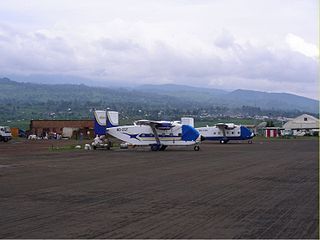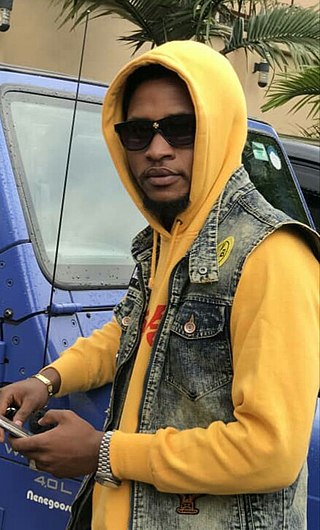Related Research Articles

Politics of the Democratic Republic of Congo take place in a framework of a republic in transition from a civil war to a semi-presidential republic.
The Armed Forces of the Democratic Republic of the Congo is the state organisation responsible for defending the Democratic Republic of the Congo. The FARDC was rebuilt patchily as part of the peace process which followed the end of the Second Congo War in July 2003.

The Democratic Republic of the Congo (DRC), also known as Congo-Kinshasa and formerly known as Zaire, is a country in Central Africa bordered to the west by the South Atlantic Ocean. By land area, the DRC is the second-largest country in Africa and the 11th-largest in the world. With a population of around 112 million, the Democratic Republic of the Congo is the most populous officially Francophone country in the world. The national capital and largest city is Kinshasa, which is also the nation's economic center. The country is bordered by the Republic of the Congo, Central African Republic, South Sudan, Uganda, Rwanda, Burundi, Tanzania, Zambia, Angola, and the Cabinda exclave of Angola.

North Kivu is a province bordering Lake Kivu in the eastern Democratic Republic of the Congo. Its capital is Goma.

South Kivu is one of 26 provinces of the Democratic Republic of the Congo. Its capital is Bukavu.

Bukavu is a city in eastern Democratic Republic of the Congo (DRC), lying at the extreme south-western edge of Lake Kivu, west of Cyangugu in Rwanda, and separated from it by the outlet of the Ruzizi River. It is the capital of the South Kivu province and as of 2012 it had an estimated population of 806,940.

The United Nations Organization Stabilization Mission in the Democratic Republic of the Congo or MONUSCO, an acronym based on its French name Mission de l'Organisation des Nations Unies pour la stabilisation en République démocratique du Congo, is a United Nations peacekeeping force in the Democratic Republic of the Congo (DRC) which was established by the United Nations Security Council in resolutions 1279 (1999) and 1291 (2000) to monitor the peace process of the Second Congo War, though much of its focus subsequently turned to the Ituri conflict, the Kivu conflict and the Dongo conflict. The mission was known as the United Nations Mission in the Democratic Republic of Congo or MONUC, an acronym of its French name Mission de l'Organisation des Nations Unies en République démocratique du Congo, until 2010.
Panzi Hospital in Bukavu, the capital of the Sud-Kivu province in the Democratic Republic of the Congo. It specializes in treating survivors of violence, the large majority of whom have been sexually abused. After years of military rape in South Kivu, there is increased civilian adoption of sexual violence.
Congolese history in the 2000s has primarily revolved around the Second Congo War (1998–2003) and the empowerment of a transitional government.

The Kivu conflict began in 2004 in the eastern Congo as an armed conflict between the military of the Democratic Republic of the Congo (FARDC) and the Hutu Power group Democratic Forces for the Liberation of Rwanda (FDLR) in the Democratic Republic of the Congo. It has broadly consisted of three phases, the third of which is an ongoing conflict. Prior to March 2009, the main combatant group against the FARDC was the National Congress for the Defence of the People (CNDP). Following the cessation of hostilities between these two forces, rebel Tutsi forces, formerly under the command of Laurent Nkunda, became the dominant opposition to the government forces.

Women in the Democratic Republic of the Congo have not attained a position of full equality with men, with their struggle continuing to this day. Although the Mobutu regime paid lip service to the important role of women in society, and although women enjoy some legal rights, custom and legal constraints still limit their opportunities.

Kavumu Airport is an airport serving Bukavu, the capital city of the Sud-Kivu province in the Democratic Republic of the Congo. The airport is 25 kilometres (16 mi) north of Bukavu.

The Democratic Republic of the Congo, and the east of the country in particular, has been described as the "Rape Capital of the World," and the prevalence and intensity of all forms of sexual violence has been described as the worst in the world. Human Rights Watch defines sexual violence as "an act of a sexual nature by force, or by threat of force or coercion," and rape as "a form of sexual violence during which the body of a person is invaded, resulting in penetration, however slight, of any part of the body of the victim, with a sexual organ, or of the anal or genital opening of the victim with any object or other part of the body."
The Democratic Republic of the Congo (DRC) is a source and destination country for men, women, and children subjected to trafficking in persons, specifically conditions of forced labor and forced prostitution. The majority of this trafficking is internal, and much of it is perpetrated by armed groups and government forces outside government control within the DRC's unstable eastern provinces.

Minova is a town in the Kalehe Territory, Democratic Republic of the Congo. It is an important business center for farm-fishery products. It is very close to Idjwi Island, Masisi Territory, Lake Kivu on its North Western shore and is only 45 km from the Goma city. The town's development is linked with important refugee-related history, including those from Rwanda in 1994, those from Masisi in 1992–1997, and other surrounding areas in northern South Kivu Province, Democratic Republic of the Congo. It is known for being the site of the systematic rape of refugees by DRC troops. WE actually find many local organisations involved in the management of Gender Based Violence (GBV) working tirelessly to restore dignity to women and girls who were raped( Panzi Foundation DRC is one of them, and it is very active in Buzi -Bulenga area).
Solange Lwashiga Furaha is a human and women's rights activist from the Democratic Republic of the Congo, and the executive secretary of the South Kivu Congolese Women's Caucus for Peace.

Corneille Akilimali Bufole, better known as Cor Akim, is a Congolese singer, songwriter, pianist and worship leader, born in Bukavu, capital of South Kivu Province in eastern Democratic Republic of Congo and based in Nairobi in Kenya.
Douce Namwezi N'Ibamba is a journalist, radio producer and social entrepreneur from the Democratic Republic of the Congo (DRC), who empowers women through education and training, with a particular emphasis on gender equality and menstrual hygiene. She is also the president of the board of the cultural space called, Espace Culturel Kwetu Art.
The Fifty Percent Women or Nothing Dynamic is a campaigning group based in South Kivu, uniting several civil society women's organizations in the Democratic Republic of the Congo. The group calls for full implementation of Article 14 of the Constitution, which guarantees gender parity in the management of public affairs at national, provincial and local level.

In early 2022, heavy rain caused large floods to hit the city of Bukavu, South Kivu, Democratic Republic of the Congo.
References
- 1 2 Valerie Møller; Benjamin J. Roberts (2021). Quality of Life and Human Well-Being in Sub-Saharan Africa. Springer Nature. p. 136. ISBN 978-3-030-65788-8.
- ↑ Maria Martin de Almagro (14 August 2018). "Women activists in the DRC show how effective alliances can be forged" . Retrieved 26 February 2021.
- ↑ Harriet Lamb (23 July 2017). ""Peace" Is a Verb—and "Women" Is the Noun". Women's E-News. Retrieved 26 February 2021.
- ↑ "Respect for fundamental rights and freedoms key for peaceful polls in DRC – UN mission chief". UN News. 27 August 2018. Retrieved 26 February 2021.